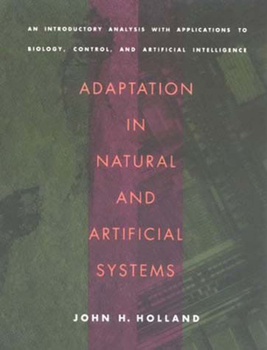Adaptation in Natural and Artificial Systems: An Introductory Analysis with Applications to Biology, Control, and Artificial Intelligence
(Part of the Complex Adaptive Systems Series)
Select Format
Select Condition 
Book Overview
Genetic algorithms are playing an increasingly important role in studies of complex adaptive systems, ranging from adaptive agents in economic theory to the use of machine learning techniques in the design of complex devices such as aircraft turbines and integrated circuits. Adaptation in Natural and Artificial Systems is the book that initiated this field of study, presenting the theoretical foundations and exploring applications. In its...
Format:Paperback
Language:English
ISBN:0262581116
ISBN13:9780262581110
Release Date:April 1992
Publisher:Bradford Book
Length:232 Pages
Weight:1.00 lbs.
Dimensions:0.6" x 7.0" x 8.9"
Age Range:18 years and up
Grade Range:Postsecondary and higher
Related Subjects
Artificial Intelligence Artificial Life Behavioral Sciences Biological Sciences Biology & Life Sciences Cognitive Psychology Computer Science Computers Computers & Technology Control Systems Ecology Evolution Health, Fitness & Dieting Health, Fitness & Dieting Human Vision & Language Systems Microprocessors & System Design Psychology Psychology & Counseling Science Science & Math Science & Scientists Science & TechnologyCustomer Reviews
3 ratings
The founder's words
Published by Thriftbooks.com User , 19 years ago
This is a wonderful time. We can read about information theory in Shannon's own words, fuzzy logic in Zadeh's, relativity in Einstein's, and genetic programming in Holland's. He created evolutionary algorithms, and shares his thoughts in this brief work. 1975, when he first published this work, was a long time ago. Since then, computing has advanced, computing demands have advanced, and biology has advanced. Biology, because it functions at all the levels from atoms to worlds, has bottomless potential for insight. Because the atoms, the worlds, and everything between are all unfriendly, biology has many problems to solve. It doesn't matter whether you are an oak tree, a virus, or a whale, the solution (at the species level) is the same: evolve. Holland was the first to harness that incredible problem-solving power to computational use. A huge literature has built up from Holland's founding thoughts. Those thoughts are here, in their original and purest form. It is hardly surprising that Holland anticipated so many elaborations of his work. One, in particular, struck me: the idea of 'hot spots' for genetic crossover. Or rather the opposite: 'cold spots' where crossover is inhibited. As a computer scientist, Holland's first thoughts were written in binary. When you allow points where crossover can not occur, you allow coherent multibit values - maybe even floating point. It's easy to laugh at Holland's initial naivete now, but he was talking about the foundations, not the structure built up from it. If you have ever programmed genetic algorithms, you have been stunned by their effectiveness in creating good solutions. 'Good' doesn't mean precisely optimal, but pretty damm good anyway. If you were a hard core creationist to start with, you still are. But now you know that evolutionary problem solving is powerful, broad, subtle, and effective - so much, that it's hard to believe it could ever have arisen by chance. //wiredweird
Not an Introductory book
Published by Thriftbooks.com User , 19 years ago
I am learning by myself the topic of Genetic Algorithms (GA) for my PhD dissertation. Even though this book is written for John H. Holland considered the father of Genetics Algorithms, this is not a basic or easy reading book. The book does not contain any source code and even though it contains some kind of pseudocode, it will not give you a clear idea about how to implement a GA. If you want an introduction book maybe you should look for the Mitchell Melanie's book "An Introduction to Genetic Algorithms" , Fogel's book "Evolutionary Computation vol. 1" or Chamber's book "The Practical Handbook of Genetic Algorithms". The way the author approaches the development of the framework is sometimes overwhelming because the author does not concentrate in one specific case or concept but he mentions all the different possibilities almost at the same time. I think it is worthwhile to buy the book to have it for advanced understanding of the concepts involved in the study of Complex Adaptive System. My approach to learn GA will be reading the above mentioned books and then study this book in a very detailed and slowly way to digest the huge amount of concepts and information provided by it.
Genetic Algorithms Classic for Engineering
Published by Thriftbooks.com User , 24 years ago
This book presents an inspirational synthesis from mathematics, computer science and systems theory addressing genetic algorithms and their role in intelligent engineering/business systems.Topics include: background, a formal framework, illustrations (genetics, economics, game playing, searches, pattern recognition and statistical inference, control and function optimization, and central-nervous system), schemata, the optimal allocation of trials, reproductive plans and genetic operators, the robustness of genetic plans, adaptation of coding and representations, and overview, interim and prospectus.Inclusion of a disk of spreadsheet-based examples would have increased user-friendliness to the sometimes moderately-complex mathematics. Otherwise, this book is a well presented, and useful classic for researchers and software vendors seeking to develop more innovative intelligent products.






